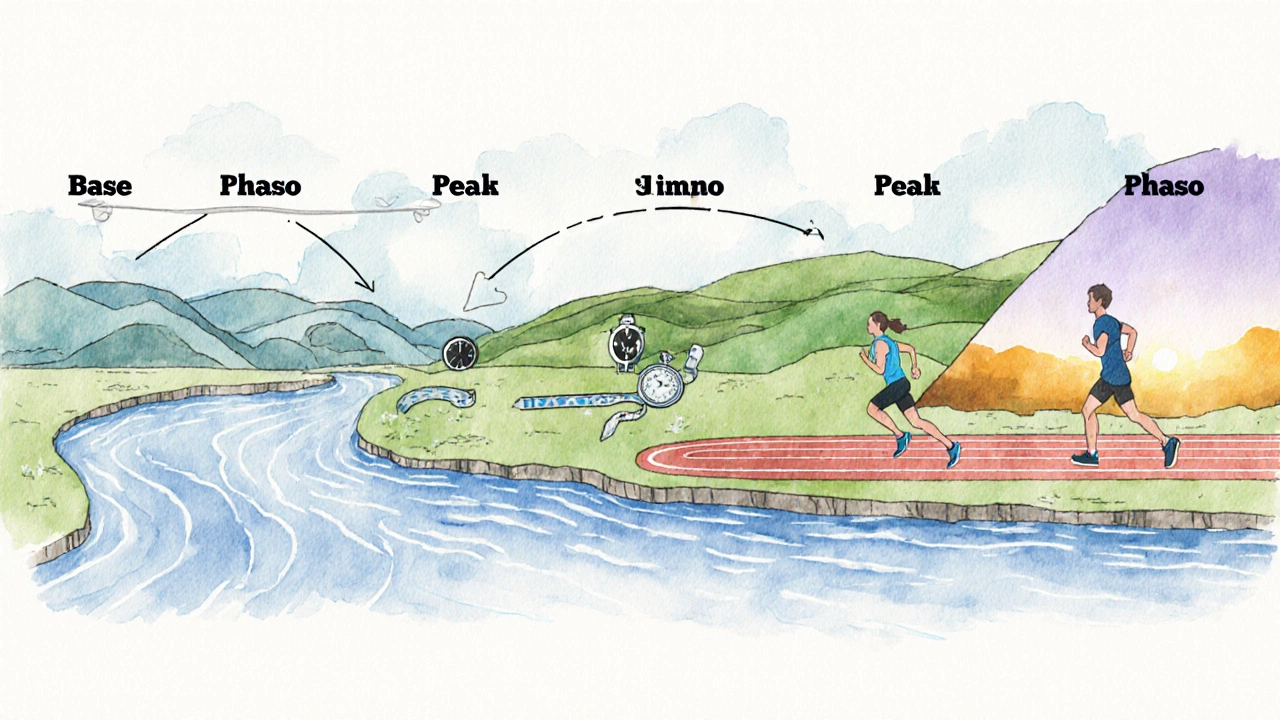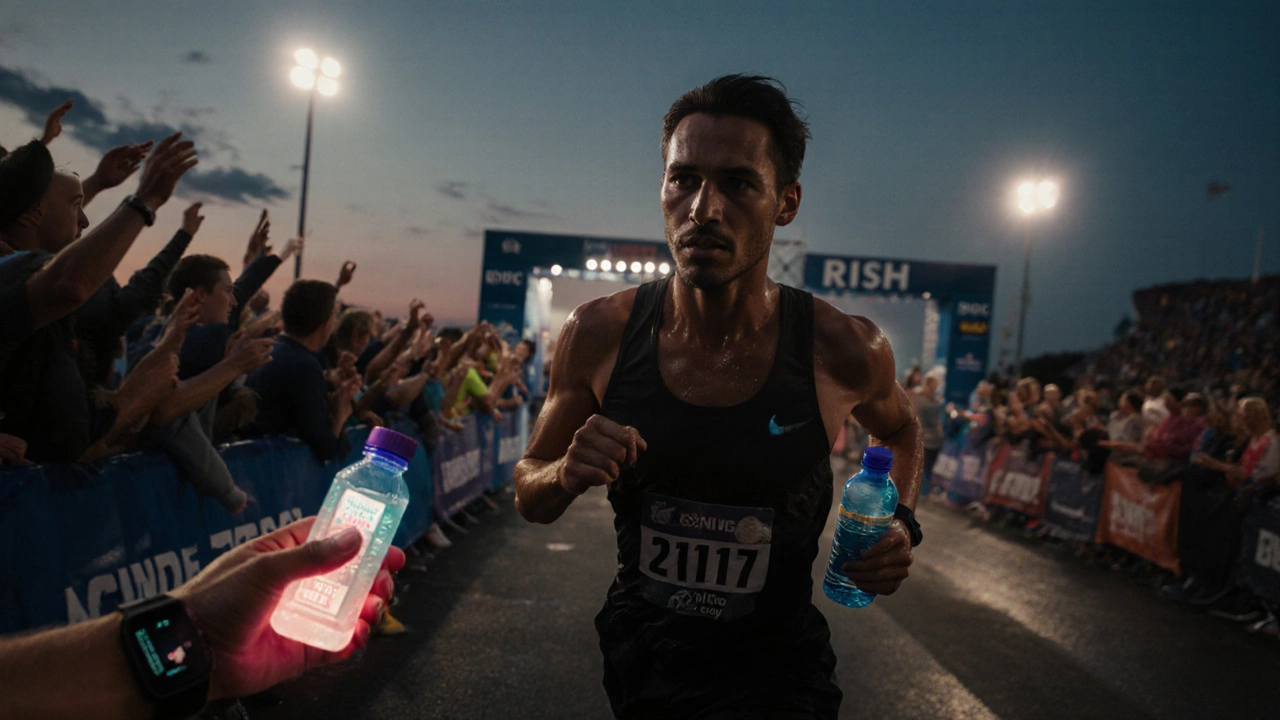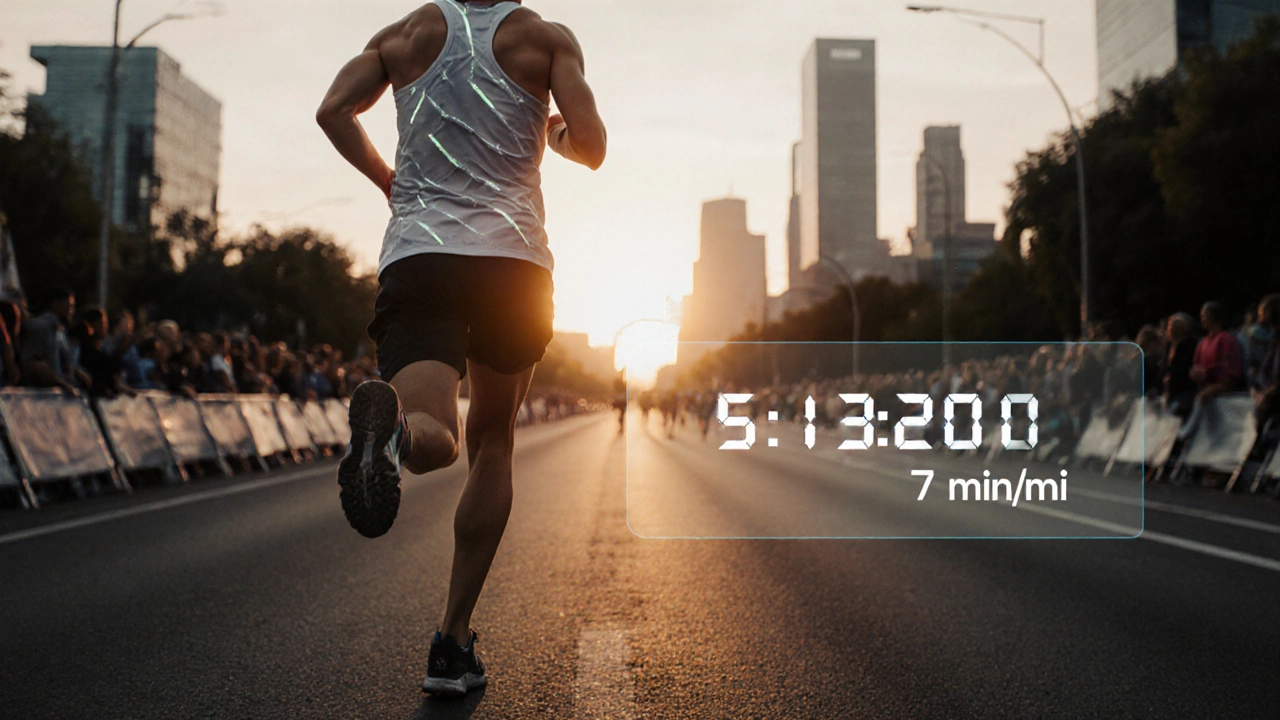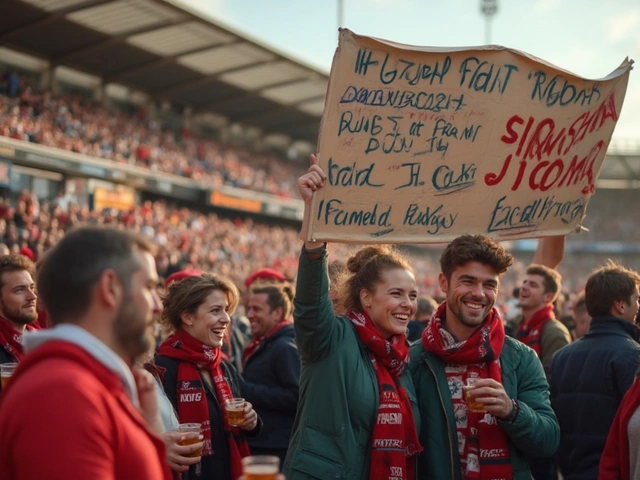5‑Hour Marathon Pace Explained: Minutes per Mile & Training Tips
Marathon Pace Calculator
Set Your Goal Time
When runners ask, “What 5 hour marathon pace should I aim for?” the short answer is about 11 minutes 27 seconds per mile (≈7 minutes 6 seconds per kilometre). That number seems simple, but hitting it consistently requires a clear plan, realistic splits, and smart race‑day tactics.
How the Pace is Calculated
First, let’s break down the math. A marathon covers 26.2 miles (42.195 km). Five hours equals 300 minutes. Divide the total minutes by the distance:
- Minutes per mile: 300 ÷ 26.2 ≈ 11.45 minutes → 11 min 27 sec per mile
- Minutes per kilometre: 300 ÷ 42.195 ≈ 7.11 minutes → 7 min 6 sec per km
This calculation gives you the average speed you need to sustain from start to finish. In practice, most runners use a slight negative‑split strategy-running the second half a few seconds slower per mile than the first-to avoid burning out early.
What the Numbers Look Like on the Course
Below is a handy table showing the exact split times you’d hit at a steady 5‑hour pace. You can program these into a GPS watch or a smartphone app to stay on track.
| Marker | Elapsed Time | Average Mile Pace | Average Km Pace |
|---|---|---|---|
| 5 km | 35 min 30 sec | 11:27 | 7:06 |
| 10 km | 1 h 11 min 00 sec | 11:27 | 7:06 |
| 15 km | 1 h 46 min 30 sec | 11:27 | 7:06 |
| Half‑marathon (21.1 km) | 2 h 30 min 00 sec | 11:27 | 7:06 |
| 30 km | 3 h 31 min 00 sec | 11:27 | 7:06 |
| Full marathon (42.195 km) | 5 h 00 min 00 sec | 11:27 | 7:06 |
Key Factors That Can Shift Your Pace
Even if the math checks out, real‑world conditions can push your pace up or down. Keep these variables in mind:
- Course profile: Hills, sharp turns, and surface type (asphalt vs. trail) demand extra effort.
- Weather: Heat, humidity, wind, or rain can add 10‑20 seconds per mile.
- Fitness level: Your current VO₂max and lactate threshold determine how comfortably you can hold 11:27 min/mi.
- Nutrition & hydration: Missing a gel or water station often forces you to slow down later to recover.
Understanding how each factor influences you helps you tweak the plan on race day.

Training to Hit a 5‑Hour Marathon
Reaching a steady 11:27 min/mi doesn’t happen overnight. A well‑structured training plan guides you through mileage buildup, speed work, and recovery is essential. Here’s a typical 16‑week schedule for a runner aiming for a 5‑hour finish.
- Base Phase (Weeks 1‑4): 30‑40 km per week, 3‑4 runs, easy pace (≈13‑14 min/mi). Include a weekly long run starting at 12 km, adding 2 km each week.
- Build Phase (Weeks 5‑10): Raise weekly mileage to 50‑60 km. Add one day of tempo work-20 minutes at 10:30 min/mi (about 15‑20 % faster than goal pace). Keep long runs at 18‑24 km, finishing the last 5 km at goal pace.
- Peak Phase (Weeks 11‑13): Weekly mileage peaks at 70‑80 km. Introduce interval sessions-6 × 800 m at 9:30 min/mi with 2‑minute jog recoveries. Long run hits 30 km, with the final 10 km at marathon pace.
- Taper (Weeks 14‑16): Reduce mileage by 20‑30 % each week, keep one short tempo or interval session, and limit the longest run to 18 km two weeks before the race.
Throughout the cycle, monitor your heart rate zone to ensure you’re training at the right intensity. For a 5‑hour goal, most of the easy mileage should sit in Zone 2 (60‑70 % of max HR), while tempo runs sit in Zone 3 (80‑85 %).
Race‑Day Pacing Strategy
On the big day, a disciplined approach often beats intuition. Follow these steps:
- Start slightly slower: Aim for 11:40 min/mi for the first 5 km. It feels conservative, but saves energy for later.
- Set incremental checkpoints: Use your GPS watch to get real‑time split alerts. Program the 5‑km and 10‑km split times from the table above.
- Fuel regularly: Grab a gel or a few bites every 45 minutes, paired with 150‑200 ml of water. This keeps blood glucose steady and prevents the dreaded “bonk”.
- Negative split: Aim to run the second half 5‑10 seconds per mile slower than the first. It’s a proven way to finish strong and avoid early fatigue.
- Final sprint: In the last 2 km, if you feel good, push the pace to 11:00 min/mi. The adrenaline and crowd energy can shave a few precious minutes.

Common Pitfalls and How to Dodge Them
Even seasoned runners stumble. Here are the usual traps and quick fixes:
- Starting too fast: It’s tempting to chase the excitement. Stick to the plan; a 20‑second per mile early surge can cost 10‑15 minutes overall.
- Skipping hydration: Dehydration sneaks up, especially in warm weather. Set a timer on your watch to remind you every 30‑45 minutes.
- Ignoring terrain: If the course has hills, adjust your effort rather than your speed. Keep heart‑rate steady, even if your pace drops on climbs.
- Over‑relying on “feel”: Trust numbers. Use your watch’s pace alerts instead of guessing.
Tools and Resources to Keep You on Track
Technology can be a huge ally. Below is a quick rundown of the most useful gear for a 5‑hour marathon attempt.
- Dedicated pace calculators (e.g., Runner’s World Pace Calculator). Input the target time and get per‑mile and per‑km splits instantly.
- GPS watches with split alerts (Garmin Forerunner 255, Polar Vantage). Set custom alerts for each 5‑km checkpoint.
- Training apps (TrainingPeaks, Final Surge) that let you upload a personalized training plan and track weekly mileage.
- Nutrition gels (GU Energy, Clif Shot) that provide ~100 kcal per serving, perfect for the 45‑minute fueling window.
- Compression socks for recovery after long runs-help reduce muscle soreness and improve circulation.
Putting It All Together
Reaching a 5‑hour marathon is a realistic goal for many recreational runners. By understanding the exact 5 hour marathon pace (11:27 min/mi or 7:06 min/km), mapping out your splits, training methodically, and leveraging smart pacing tools, you’ll put yourself in the best position to cross the finish line on time.
What is the exact per‑mile pace for a 5‑hour marathon?
A 5‑hour marathon requires an average of about 11 minutes 27 seconds per mile (≈7 minutes 6 seconds per kilometre).
Should I aim for a negative split?
Yes. Running the second half a few seconds slower per mile helps you conserve energy and finish strong.
How much should I train each week?
During the peak phase, aim for 70‑80 km (45‑50 miles) weekly, split across easy runs, a long run, and one speed or tempo session.
What nutrition strategy works best on race day?
Consume a 100‑kcal gel and 150‑200 ml of water every 45 minutes. Adjust for temperature and personal tolerance.
Can I use a smartwatch to stay on pace?
Absolutely. Set split alerts for each 5‑km segment on devices like the Garmin Forerunner 255 to get real‑time feedback.









